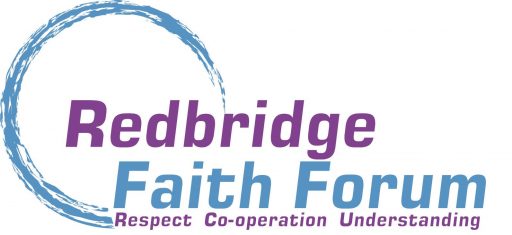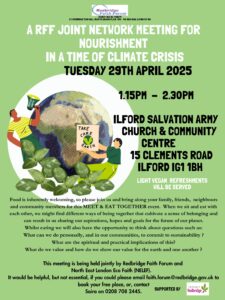RFF Network Meeting – ‘A Meeting for Nourishment in a Time of Climate Crisis’
Redbridge Faith Forum joint Network Meeting with North East London Eco Faith (NELEF) .
A Meeting for Nourishment in a Time of Climate Crisis
Tuesday 29th April 2025
Ilford Salvation Army Church & Community Centre, 15 Clements Road, Ilford IG1 1BH
A joint event between Redbridge Faith Forum and North East London Eco Faith was held at Ilford Salvation Army on Tuesday 29th April. Over 70 people gathered for a heartfelt MEET & EAT TOGETHER event focused on the intersection of food, community, and climate action. In the warm and welcoming environment of the Ilford Salvation Army, participants shared a delicious vegan lunch—an intentional choice that reflected both inclusivity and sustainability.
Food, inherently communal, served as a powerful medium for connection. As we sat and ate together, we explored new ways of being in community—ways that nurture belonging, spark dialogue, and inspire shared commitment to a more just and sustainable world.
The session was introduced by Jo Law who outlined the work of NELEF. Following this everyone discussed a number of the key issues surrounding this subject in small groups. Among the issues discussed were the importance of not only what we eat but how we eat and the positive impact of eating locally produced food and minimising waste.
Attendees reflected on a series of thought-provoking questions while sharing lunch. These encouraged reflection on how our food choices and habits can be aligned with spiritual values and environmental stewardship.
The event created opportunities for interfaith dialogue, with many attendees appreciating the diversity of views shared. Conversations highlighted shared values around gratitude, sustainability, and mindful eating.
Discussion Questions & Participant Responses
Question 1:
How might eating seasonally and locally connect us to place and the earth?
- Supports the local economy and creates employment
- Often more nutritious, fresh, and organic
- Reduces packaging, transport emissions, and chemical use
- Promotes appreciation for creation and variety
- Tends to be cheaper; can be subsidised or supported through community programs
- Encourages resource efficiency and low-impact lifestyles
- Builds community knowledge via allotments, composting, and food education
- Food grown locally is more likely to adhere to strict environmental and labour standards
- Inspires education and skill-building, such as cooking classes and growing your own food
Question 2:
If every day is sacred, what do our daily practices (such as the way we eat) mean to us?
- Eating can be a prayerful, family-centred experience
- Cooking together and sharing meals strengthens bonds
- Importance of reducing waste, including packaging and plastics
- Respecting food safety (e.g., use-by vs. sell-by dates)
- Following faith-based dietary rules and traditions
- Using food-saving apps like OLIO and Too Good To Go
- Awareness of how food is prepared and handled (e.g., hygiene, separation of meat/dairy)
- Consciousness around overeating, reheating, and portion sizes
Question 3:
What is the role of community in facing the climate crisis?
- Promoting sustainable transport (e.g., walking, public transport)
- Encouraging composting, plantation, and waste reduction
- Advocating for less plastic, recycling, and better food use
- Educating about expiration dates, food preservation, and buying practices
- Supporting green spaces, community gardens, and pollinator pathways
o Example: Friends of Loxford care for Loxford Park and plant pollinator-friendly flowers
o Love Loxford Lane encourages community stewardship of green areas
Additional Reflections
Participants also shared personal practices and cultural insights:
- “I only eat asparagus in May—it’s produced in Britain during that month.”
- “I eat Sharon fruit in autumn—it can only be bought in that season.”
- “Fresh coriander is available all year round.”
- “My eating patterns reflect seasons and festivals like Ramadan and Lent.”
- “It’s good to eat locally and seasonally, but also useful to use preserved options like frozen veg, dried lentils, and soy products.”
After 20 minutes of lively conversations, there was the opportunity to feedback the outcomes of the discussions to the wider group and we heard a wide range of responses including:
- giving thanks for food before we eat
- growing more food ourselves
- eating prayerfully
- educating children in schools about where food comes from and seasonal foods
- different faiths and their practices related to eating and fasting
- learning to cook from fresh ingredients with local cooking classes
- community allotments
- less packaging & chemicals
- appreciation of creation
- using apps that reduce food waste such as:
o olio https://olioapp.com/en/
o too good to go https://www.toogoodtogo.com/en-us
These reflections created a space not only for conversation but for envisioning action—planting seeds of hope, responsibility, and transformation rooted in both shared values and the urgency of the climate crisis.
The guest speaker, Gordon Carr from the Salvation Army, spoke passionately about the positive benefits about veganism and its ethical and ecological benefits. He emphasised how shifting towards plant-based diets could significantly reduce animal suffering and help preserve the planet.
Event Reflections
The format of “Meeting for Nourishment” proved to be a powerful model for community learning, interfaith dialogue, and eco-conscious reflection. It showcased the potential of shared meals and open conversations to inspire individual and collective action around climate justice, food ethics, and spiritual mindfulness. It was well received and seen as worth repeating .
On the feedback form there were many positive comments about the usefulness of working together; being able to hear the opinions of others and having good group table discussions; being able to meet and network with people from all different groups and faith groups; learning about veganism and organic growing; hearing about the dietary practices of other faiths; awareness of the relationship between food and the climate re growing, purchasing and dealing with waste; the benefits of downloading the Olio and Too Good to Go apps; and how much is actually going on in the borough to improve the community in relation to food waste and the environmental effects.
Our special thanks to our speakers and Charlotte from the Salvation Army who made us so welcome, for the warm hospitality and support.

